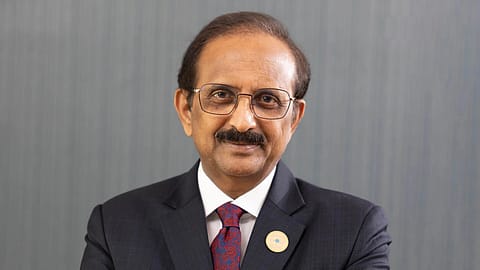Why the SBI chairman sees a private capex revival around the corner
The bank has identified eight new emerging sectors, including semiconductors, green steel, and green hydrogen

Is the private investment cycle turning for good? State Bank of India (SBI) chairman C.S. Setty believes so. Amid US trade tariff tantrums and economic uncertainties, the head of India’s largest lender expressed strong confidence in a resurgence of private capital expenditure.
“Most of the core sector is working at a capacity utilisation of 75%, which means that is the right time for expansion,” Setty tells Fortune India in an exclusive interview. Delaying investment could invite import threats if demand outstrips local supply. “If the end-user industry starts demanding, and if local companies are not able to supply, there is a potential import threat which they should be ready for. So, instead of waiting for demand to stabilise, if they have reached 75-80% [utilisation levels], it's time to actually invest [in capex],” says Setty.
SBI’s sanctioned corporate credit pipeline of ₹7.2 lakh crore, comprising both working capital and capex, underscores this potential. While corporates are currently “sitting on cash” Setty expects them to tap bank lines as internal funds dwindle. “They would draw the lines only after they exhaust their return cash rewards,” says Setty.
The state-owned lender sees transformative growth in new sectors. Private capex is already active in areas such as renewables, road and data centres, but the real momentum lies in emerging industries. The bank has identified eight new emerging sectors, including semiconductors, green steel, and green hydrogen. “Some sectors have some maturity of funding, while other are quite new in terms of financing aspects,” adds Setty.
To seize this opportunity, SBI is launching a “center of excellence for emerging industries” within months, with dedicated teams to understand and finance sectors like semiconductors and green hydrogen. “As a lender, we need to understand these industries,” Setty stressed, aiming to create “bankable projects” independent of government subsidies. “It is also working with them that what kind of technology to be established, how the market linkages can be established,” he added, redefining the bank’s role as a collaborative partner.
Startups, too, are on SBI’s radar. While early-stage funding remains the domain of venture capital, SBI is supporting mature startups through government-backed schemes and has established six specialised startup branches across India to provide financing and advisory services. “In the startup ecosystem more than the financing, they require the advising,” Setty said, offering pro bono guidance on foreign exchange, FEMA compliance, and bookkeeping to help startups navigate complex regulations.
For now, all eyes will be on how the capex cycle moves as, according to the RBI, banks and financial institutions sanctioned 907 projects worth ₹3.68 lakh crore in FY25. Setty is confident that the economy will be able to weather the macro headwinds. “India has lived through the uncertainties over the past five years. We have had Covid, supply chain disruptions and trade shifts owing to the tariffs. But one thing that comes out is that the resilience of Indian economy. It doesn't mean to say that the global uncertainty is not impacting, as we are not completely decoupled, but I personally believe that India has weathered much better than many other countries globally,” says Setty.
Recommended Stories
With private capex primed to rebound and new sectors such as renewables, semiconductors, and green hydrogen leading the charge, Setty’s vision is to position SBI not just as a lender but as a catalyst for growth in a rapidly evolving economy.
